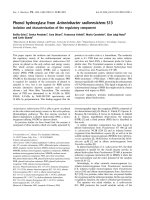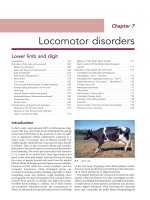WHEN THINGS GO WRONG – DISEASES AND DISORDERS OF THE HUMAN BRAIN docx
Bạn đang xem bản rút gọn của tài liệu. Xem và tải ngay bản đầy đủ của tài liệu tại đây (8.83 MB, 250 trang )
WHEN THINGS GO
WRONG – DISEASES
AND DISORDERS OF
THE HUMAN BRAIN
Edited by Theo Mantamadiotis
When Things Go Wrong – Diseases and Disorders of the Human Brain
Edited by Theo Mantamadiotis
Published by InTech
Janeza Trdine 9, 51000 Rijeka, Croatia
Copyright © 2012 InTech
All chapters are Open Access distributed under the Creative Commons Attribution 3.0
license, which allows users to download, copy and build upon published articles even for
commercial purposes, as long as the author and publisher are properly credited, which
ensures maximum dissemination and a wider impact of our publications. After this work
has been published by InTech, authors have the right to republish it, in whole or part, in
any publication of which they are the author, and to make other personal use of the
work. Any republication, referencing or personal use of the work must explicitly identify
the original source.
As for readers, this license allows users to download, copy and build upon published
chapters even for commercial purposes, as long as the author and publisher are properly
credited, which ensures maximum dissemination and a wider impact of our publications.
Notice
Statements and opinions expressed in the chapters are these of the individual contributors
and not necessarily those of the editors or publisher. No responsibility is accepted for the
accuracy of information contained in the published chapters. The publisher assumes no
responsibility for any damage or injury to persons or property arising out of the use of any
materials, instructions, methods or ideas contained in the book.
Publishing Process Manager Sandra Bakic
Technical Editor Teodora Smiljanic
Cover Designer InTech Design Team
First published February, 2012
Printed in Croatia
A free online edition of this book is available at www.intechopen.com
Additional hard copies can be obtained from
When Things Go Wrong – Diseases and Disorders of the Human Brain,
Edited by Theo Mantamadiotis
p. cm.
ISBN 978-953-51-0111-6
Contents
Preface IX
Part 1 Syndromes and Disorders 1
Chapter 1 The Unique Properties of the
Prefrontal Cortex and Mental Illness 3
Wen-Jun Gao, Huai-Xing Wang,
Melissa A. Snyder and Yan-Chun Li
Chapter 2 Neurocognitive Aspects of
Tourette Syndrome and Related Disorders 27
Marc E. Lavoie and Kieron P. O’Connor
Chapter 3 How Much Serotonin in the CNS is Too Much? 51
Rui Tao and Zhiyuan Ma
Chapter 4 Brain Commissural Anomalies 69
Behpour Yousefi
Chapter 5 Advances in Neuromodulation:The Orbitofrontal
-Striatal Model Of, and Deep Brain
Stimulation In, Obsessive-Compulsive Disorder 111
Robert K. McClure
Part 2 Neurodegenerative
Diseases: In Search of Therapies 123
Chapter 6 In Search of Therapeutic
Solutions for Alzheimer’s Disease 125
Ricardo B. Maccioni, Gonzalo Farías,
Leonel E. Rojo and José M. Jiménez
Chapter 7 Bis(12)-Hupyridone, a Promising Multi-Functional
Anti-Alzheimer’s Dimer Derived from Chinese Medicine 151
Wei Cui, Tony Chung-Lit Choi, Shinghung Mak, Hua Yu,
Shengquan Hu, Wenming Li, Zhong Zuo and Yifan Han
VI Contents
Chapter 8 Schisandrin B, a Lignan from Schisandra
chinensis Prevents Cerebral Oxidative Damage
and Memory Decline Through Its Antioxidant Property 175
Tetsuya Konishi, Vijayasree V. Giridharan
and Rajarajan A. Thandavarayan
Part 3 Brain Cancer 189
Chapter 9 CREB Signaling in Neural Stem/Progenitor
Cells: Implications for a Role in Brain Tumors 191
Theo Mantamadiotis, Nikos Papalexis and Sebastian Dworkin
Part 4 Brain Imaging 205
Chapter 10 MRI Techniques and New
Animal Models for Imaging the Brain 207
Elodie Chaillou, Yves Tillet and Frédéric Andersson
Preface
From ancient times there was an appreciation, albeit controversial at the time, that
mind and brain occupied the same space. Man’s fascination with the human brain
led to an evolution of thinking as to the origin of what we now call mental disorders.
The Hippocratic Doctors of Ancient Greece left us with scripts describing the early
philosophical-scientific thoughts of the nature of the brain and its ailments. In ‘On
the Sacred Disease’ Hippocrates (400 B.C.) writes: “It ought to be generally known
that the source of our pleasure, merriment, laughter and amusement, as of our grief,
pain, anxiety and tears, is none other than the brain. It is specially the organ which
enables us to think, see and hear, and to distinguish the ugly and the beautiful, the
bad and the good, pleasant and unpleasant It is the brain too which is the seat of
madness and delirium, of the fears and frights which assail us” (Taken from
Chadwick and Mann’s translation, The medical works of Hippocrates, 1950, Oxford:
Blackwells, pp. 179-189).
For all the advances in the medical and life sciences, the brain is perhaps still the least
understood organ of the human body. This is in no way due to the lack of interest or
research on the brain but rather due to the complexity of its structure at the
macroscopic, microscopic and molecular levels. The brain provides clinicians and
scientists a black box which is slowly being illuminated by the advances in
understanding through advances in research. For patients suffering from disorders
and diseases of the brain, the advances in brain research provide hope in the form of
their own understanding of what is going wrong and in the form of advances in novel
therapies which help alleviate debilitating symptoms.
In this book we have experts writing on various neuroscience topics ranging from
mental illness, syndromes, compulsive disorders, brain cancer and advances in
therapies and imaging techniques. Although diverse, the topics provide an overview
of an array of diseases and their underlying causes, as well as advances in the
treatment of these ailments. This book includes three chapters dedicated to
neurodegenerative diseases, undoubtedly a group of diseases of huge socio-economic
importance due to the number of people currently suffering from this type of disease
but also the prediction of a huge increase in the number of people becoming afflicted.
X Preface
The book also includes a chapter on the molecular and cellular aspects of brain cancer,
a disease which is still amongst the least treatable of cancers.
Theo Mantamadiotis, PhD
Department of Pathology
The University of Melbourne,
Melbourne,
Australia
Laboratory of Physiology
Medical School
University of Patras
Rio-Patras, Greece
Part 1
Syndromes and Disorders









